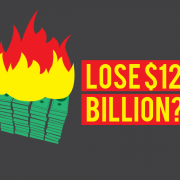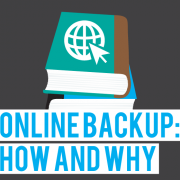Avoid the Impending Digital Pile up!
With all the ease and numerous new conveniences that have been brought about in our increasingly digitized era, it is easy to forget that there can be consequences to the constantly expanding amounts of data that we are creating. With many of us spending much of our days sending email after email, texting endlessly to our friends and repeatedly updating our status on Facebook, hardly any of us ever take the time to think about how all of this data is going to end up impacting our personal futures or, more importantly, the environment.

Indeed, as we all continue to add to this “digital pile up” most of us have no idea how or where all this data is being stored, usually assuming that our growing online storage accounts are all just floating out there “in the cloud” somewhere. However, the reality of the situation is that as we continue to add to the amount of land that data storage houses and server farms must physically occupy we are in turn serving to add to the problem of the increasing over development of our fragile planet earth. In addition to this, the need for more servers to store all of this data requires the consumption of more electricity in order to keep them running, bringing about even more harm to the environment.
Now, some of you reading this might think that, due to the unstoppable nature of the increasing digitization of almost all forms of modern communication, worrying about an overabundance of data and the impacts that it may bring about is an exercise in futility. After all, this data is of vital importance and thus must continue to exist, regardless of any ill effects it may or may not bring about, in order for commerce, and indeed society itself, to continue functioning. However, what most people don’t realize is that a staggering seventy-five percent of all consumer data contained in data storage houses is useless duplicate information that need not exist at all in the first place! So, in other words, an increase in efficiency and conservation when it comes to the amount that we are adding to this expanding data pile could easily help potentially solve (or at least lessen the effects of) this impending situation!
Others might be assuming that this problem is the sole fault of the big businesses, which of course, at least on the surface, is an understandable conclusion to reach. In addition to this you might be wondering what just one person can do to really cut down on the amount of data we are creating in the world. Well, you might find it interesting to know that seventy percent of all the data stored out there in “the cloud” is in fact the data of individual users, with this data estimated to be around 1.2 zettabytes (a zettabyte equals one billion terabytes). This is certainly a shocking figure, with experts projecting that the amount of data created by consumers will be expanding by forty-four times over the next ten years!
And, the disasters that this data pile up could eventually bring about don’t stop with its effect on the environment. As businesses continue to create more and more data they are unfortunately putting themselves increasingly at risk for losing all the value that all this data represents in the first place. With data storage amounts continuing to grow, the cluttered mass of data that businesses are building up, much of it being redundant, is going to eventually become harder and harder to sort through. Anyone who is familiar with the critical nature of digital information knows that if you can’t find a file then it might as well not exist in the first place! For this reason, if businesses everywhere do not put at least some amount of energy into organizing their data and deleting that which is not important, there could indeed be a heavy price for them to pay in the near future.
So, in summary, much like global warming, avoiding the big digital pile up is not going to be easy. Sorting, de-duplicating and archiving inactive data all take time. However, as awareness over this issue is hopefully raised over the next couple of years, there will be steps that everyone can take to cut down on the amount of redundant and unnecessary data creation that we participate in, which will not only help our planet, but serve to streamline our businesses as well.








Leave a Reply
Want to join the discussion?Feel free to contribute!